Hat tip to Gideon Rachman, chief foreign-affairs columnist of the Financial Times, for providing a plausible answer to the question (Has China won?) I wrote about in the previous post. Easy to understand, argues Rachman, why China might be feeling its oats. It is opening up its economy after having [continue reading . . . ]
Will we live in a unipolar world dominated by China in 20 or 30 years? Not likely, says Columbia University professor Jeffrey Sachs. Writing in the Financial Times, Sachs notes that China’s economy, already larger than that of the U.S. measured at international prices (what is called purchasing-power parity), will [continue reading . . . ]
Don’t miss the excellent piece on the importance of immigrants to Silicon Valley in the New York Times February 9, 2017. Some highlights: “Silicon Valley is unlikely, as a phenomenon — it is not the default state of the world,” said John Collison, an immigrant from Ireland who is a [continue reading . . . ]
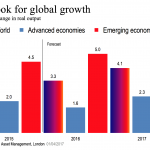
The global economy is likely to grow at between 3% and 4% in 2017 adjusted for inflation and differences in exchange rates. Emerging economies, led by Asia, are likely again to outgrow advanced economies (the U.S., Europe, Japan). That’s the word from one of the world’s most respected and widely followed [continue reading . . . ]
Terrific perspective on China’s growing importance, the coming fight in Congress over the Trans-Pacific Partnership (TPP), and the standing of the United States in a changed world in an op-ed in today’s New York Times by Clyde Prestowitz, founder and president of the Economic Strategy Institute. He delivers his punch [continue reading . . . ]
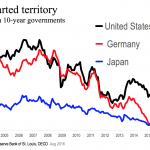
For a quick economic update for members of Bellevue Rotary recently, I updated several slides I usually include as a part of my talks and added a new one or two. You can download all of them as a PDF file here. Among bullet points: We live in a slow-growth world. [continue reading . . . ]
I can’t help but think what’s going on in global markets seems like a re-run of what happened in the fall of 2008, when Lehman Brothers failed, banks had to be bailed out and the worst recession since the Great Depression ensued. AP business writer Alex Veiga neatly sums up [continue reading . . . ]
Who would have guessed that incomes are more unequal in Communist China than in the United States? Not me. A new report from Peking University, cited in the Financial Times, says the richest 1% of China’s households own a third of the country’s wealth. The poorest 25% own just 1%. [continue reading . . . ]
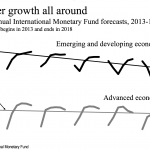
Raising interest rates a quarter point as the Fed did this week does not change the fact that we live in a slow-growth world. Money markets and commodities markets are singing the same song in unison: Almost no inflation, and very little growth. To say that commodities prices have collapsed [continue reading . . . ]
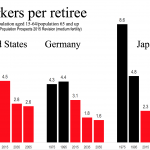
Worried about your Social Security benefits? You ought to be. Whether you are in your 70s or your 20s , the number of workers taxed to support you in our pay-as-you-go social-insurance system are or will be fewer than supported your parents and grandparents. We’re living longer and having fewer [continue reading . . . ]
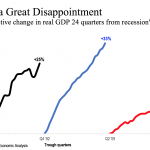
Good on us that the U.S. economy grew at an annual rate estimated at 3.7% in the April-May-June quarter rather than the 2.2% rate announced as the first estimate a month ago. But don’t get too excited. State and local government spending accounted for a higher-than-average share of the growth [continue reading . . . ]
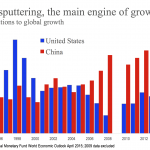
Two decades ago China’s economy was roughly a quarter the size of the U.S. economy. Today the economies are of roughly equal size, each producing about $17.5 trillion worth of goods and services based on an economic concept known as purchasing power parity (PPP). The concept discounts the effects of [continue reading . . . ]